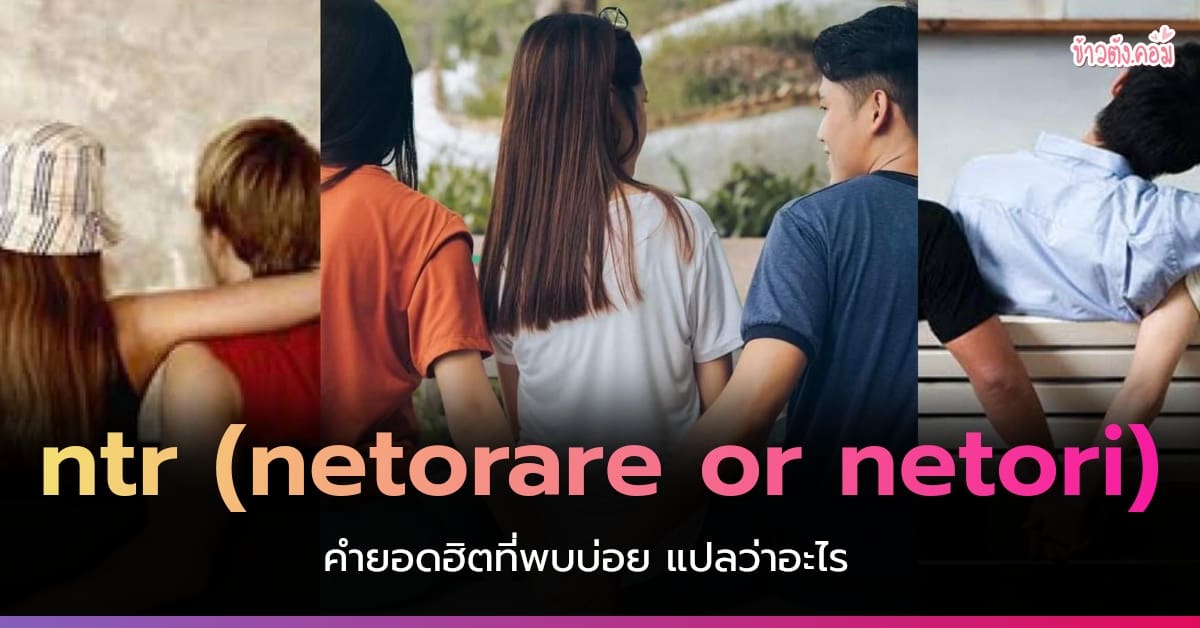Have you ever come across the term "NTR" in online conversations or social media? If you're unsure what NTR means, you're not alone. This term has gained popularity in recent years, particularly in relationship discussions and forums. Understanding its meaning is essential, especially in contexts related to trust, relationships, and communication.
NTR, which stands for "No Trespassing Rule," or more commonly in modern contexts, "Netorare," is a term that has evolved significantly over time. Its usage varies depending on the platform and audience. Whether you're exploring relationship dynamics, online slang, or media content, knowing the definition of NTR can help you navigate these discussions with clarity and confidence.
In this article, we'll delve into the meaning of NTR, its origins, and its implications in various contexts. Whether you're a curious reader or someone looking to understand the nuances of modern relationship terminology, this guide will provide valuable insights. Let's explore the world of NTR and its significance in today's digital age.
Read also:Gillie Da Kid The Wire Unveiling The Untold Story Of A Baltimore Legend
Table of Contents:
- The Origin of NTR
- What Does NTR Mean?
- Understanding NTR in Different Contexts
- The Rise of NTR in Pop Culture
- Implications of NTR in Relationships
- Statistics and Research on NTR
- Alternatives to NTR
- Common Misconceptions About NTR
- NTR in Online Communities
- Conclusion and Final Thoughts
The Origin of NTR
The term NTR has its roots in Japanese culture, particularly in anime and manga. Originally, NTR stood for "Netorare," a Japanese word that translates to "to be stolen" or "to have someone else take what is yours." This concept was commonly depicted in fictional stories where a character's partner is involved in a romantic or intimate relationship with someone else.
Over time, the term evolved and gained traction in Western cultures, particularly in online forums and social media platforms. Its usage expanded beyond fictional contexts and entered real-world discussions about relationships, trust, and fidelity.
How NTR Gained Popularity
Several factors contributed to the popularity of NTR:
- Cultural Exchange: The global influence of Japanese media, such as anime and manga, introduced NTR to a wider audience.
- Online Communities: Platforms like Reddit, Twitter, and forums dedicated to relationship discussions helped spread the term.
- Curiosity: People's natural curiosity about relationship dynamics and taboos fueled interest in NTR.
What Does NTR Mean?
NTR, in its simplest form, refers to the concept of a partner being involved with someone else, often without the other partner's consent or knowledge. While it originated in fictional contexts, NTR has been adapted to describe real-life situations involving infidelity, betrayal, or emotional affairs.
In modern usage, NTR can also refer to fantasies or role-playing scenarios where individuals explore the idea of their partner being pursued by someone else. It's important to note that NTR can have different meanings depending on the context and the individuals involved.
Read also:Exploring The Phenomenon Of Viral Odia Culture Creativity And Influence
Variations of NTR
Here are some variations of NTR that you might encounter:
- Netorare: The original Japanese term, focusing on a male partner being replaced.
- Netori: A variation where a female partner is involved with someone else.
- Non-consensual NTR: Refers to situations where one partner is unaware or unwilling.
Understanding NTR in Different Contexts
NTR can mean different things depending on the context in which it is used. Let's explore some of the most common contexts:
Fictional Context
In anime and manga, NTR is often used as a plot device to create drama and tension. Characters may face situations where their partners are pursued by others, leading to emotional conflicts and character development. This fictional portrayal has influenced how people perceive NTR in real life.
Real-Life Context
In real-life relationships, NTR can refer to infidelity or betrayal. It may involve emotional or physical involvement with someone outside the relationship, leading to trust issues and potential relationship breakdowns.
Role-Playing Context
For some individuals, NTR is a consensual fantasy or role-playing scenario. Couples may explore these ideas as part of their relationship dynamics, provided both parties agree and set clear boundaries.
The Rise of NTR in Pop Culture
NTR has become a significant part of pop culture, particularly in media that explores relationship dynamics and human emotions. Its presence in anime, manga, and other forms of entertainment has contributed to its mainstream recognition.
According to a study by the International Journal of Media and Cultural Politics, NTR themes are increasingly prevalent in modern storytelling. This trend reflects society's fascination with taboo subjects and complex relationship dynamics.
NTR in Media
Here are some examples of NTR in popular media:
- Anime: Series like "Elfen Lied" and "Highschool DxD" feature NTR themes.
- Movies: Films exploring infidelity often touch on NTR concepts.
- Books: Novels and graphic novels frequently incorporate NTR elements to add depth to their stories.
Implications of NTR in Relationships
While NTR can be a fascinating topic, its implications in real-life relationships are significant. Trust, communication, and mutual respect are essential components of any healthy relationship. When NTR scenarios occur, they can lead to emotional distress, jealousy, and relationship breakdowns.
It's crucial for individuals to address these issues openly and honestly. Setting boundaries, maintaining open lines of communication, and fostering trust can help prevent NTR-related conflicts.
Building Trust in Relationships
Here are some tips for building trust and avoiding NTR scenarios:
- Communicate Openly: Share your feelings and concerns with your partner.
- Set Boundaries: Define what is acceptable and unacceptable in your relationship.
- Practice Empathy: Understand your partner's perspective and emotions.
Statistics and Research on NTR
Research on NTR is limited, but studies on infidelity and relationship dynamics provide valuable insights. According to a survey conducted by the American Psychological Association, approximately 20-40% of married individuals report engaging in infidelity. While NTR is not directly measured in these studies, its themes overlap significantly with infidelity research.
A study published in the Journal of Social and Personal Relationships found that trust violations, such as those seen in NTR scenarios, can have lasting impacts on relationships. Participants reported increased levels of anxiety, jealousy, and dissatisfaction following trust breaches.
Key Findings
- Trust violations can lead to long-term relationship damage.
- Open communication reduces the likelihood of NTR scenarios.
- Consensual fantasies, when handled responsibly, can strengthen relationships.
Alternatives to NTR
For individuals interested in exploring relationship dynamics without the negative implications of NTR, there are several alternatives:
Consensual Non-Monogamy
Consensual non-monogamy (CNM) refers to relationships where partners agree to engage with others outside the primary relationship. This approach emphasizes consent, communication, and transparency.
Emotional Intimacy
Strengthening emotional intimacy within a relationship can reduce the desire for external involvement. Activities like therapy, date nights, and shared hobbies can enhance connection and trust.
Common Misconceptions About NTR
There are several misconceptions surrounding NTR that can lead to misunderstandings. Here are some of the most common ones:
Misconception #1: NTR is Always Negative
While NTR often carries negative connotations, it can also be a consensual fantasy for some couples. When handled responsibly, it can enhance intimacy and trust.
Misconception #2: NTR Only Happens in Fiction
Although NTR originated in fictional contexts, its themes are prevalent in real-life relationships. Infidelity and betrayal are common issues that many couples face.
NTR in Online Communities
Online communities play a significant role in shaping discussions around NTR. Platforms like Reddit, Twitter, and specialized forums provide spaces for individuals to share their experiences and perspectives.
While these communities can be informative, it's important to approach them critically. Not all information shared online is accurate or reliable. Always verify facts and seek expert advice when needed.
Engaging with NTR Communities
Here are some tips for engaging with NTR communities:
- Respect Boundaries: Be mindful of others' experiences and perspectives.
- Seek Reliable Sources: Verify information before accepting it as fact.
- Contribute Positively: Share insights and experiences that can help others.
Conclusion and Final Thoughts
NTR, whether in fictional or real-life contexts, is a complex topic that touches on trust, communication, and relationship dynamics. Understanding its meaning and implications can help individuals navigate these discussions with clarity and confidence.
In conclusion:
- NTR refers to scenarios where a partner is involved with someone else, often without consent.
- Its origins lie in Japanese media but have expanded into global discussions.
- Building trust, setting boundaries, and fostering open communication are key to preventing NTR-related conflicts.
We encourage you to share your thoughts and experiences in the comments below. Are there any aspects of NTR you'd like to explore further? Consider exploring other articles on our site for more insights into relationships and communication.

